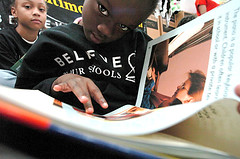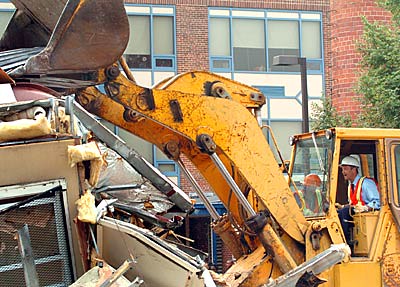Another lament about education
I am pretty much resigned to what I see as the further dissolution of the public schools in the District of Columbia. I believe this, and it depresses me, because the level of discourse on the issue, by parents and activists, strikes me as committed to not much better than the status quo. There is a failure to recognize real problems, and to grapple with them.
The reason I am writing more and more about this is because of my concern about this failure.
Granted, this is a problem at all levels of leadership in the city.
I wrote this tonight in response to an email on a community e-list about why do people care about what Mayoral candidates think about education, since they don't have control over the school system, a particularly interesting comment given what I wrote yesterday about Marion Orr's study of Baltimore's school reform efforts, as well as the process underway in Seattle to close schools.
Here's what I wrote:
While technically you are correct:
(1) this can change (the laws could be changed to bring overall oversight of the school system to the Executive Branch);
(2) Mayors have a leadership and engagement role that extends beyond merely what they can do legally and what they can influence practically;
(3) there is no question that Mayor Williams has been an active proponent of charter schools... and this has had a wide variety of impacts, not all positive--wouldn't you want to know what a Mayoral candidate thought about this and other issues?
Think about Martin O'Malley and his "Believe" campaign, which by the way, includes a Believe in the Schools component.
 At Fallstaff Elementary School, Jaday Jones looks at a book donated by the Believe in Our Schools book drive, sponsored by Mayor Martin O'Malley. Books collected from residents are given to struggling school libraries.(Sun photo by Monica Lopossay)Aug 24, 2005.
At Fallstaff Elementary School, Jaday Jones looks at a book donated by the Believe in Our Schools book drive, sponsored by Mayor Martin O'Malley. Books collected from residents are given to struggling school libraries.(Sun photo by Monica Lopossay)Aug 24, 2005. Mayor Martin O'Malley, seated at the controls of a bulldozer, kicks off his Believe in Our Schools campaign at Harbor City High, where unsightly vacant trailers had become home to crime. (Sun photo by Doug Kapustin) Jun 22, 2004.
Mayor Martin O'Malley, seated at the controls of a bulldozer, kicks off his Believe in Our Schools campaign at Harbor City High, where unsightly vacant trailers had become home to crime. (Sun photo by Doug Kapustin) Jun 22, 2004.[Speaking of politics, I think there is plenty for Mayor O'Malley to do in Baltimore, before trying to be Governor. On the hand, having a pro-transit, pro-center city, pro-regionalism governor of Maryland is important to the state of Maryland and to DC as well.]
I have been a supporter of Mayor Williams, but in some sense I think he has attention deficit disorder. He took up schools issues for a brief moment and then dropped it.
The mayor could have made it happen that simultaneous planning processes for libraries, schools, and parks and recreation were connected.
The mayor could have extended the idea of "creating a community of learning" that is allegedly guiding the library planning process to include the school system, which in fact should be at the center of "creating a community of learning."
The Mayor could have instituted a "First Day" event to communicate how important the schools are to all of us as residents of the District of Columbia. Mayor Joseph Riley of Charleston, SC attends that First Day event in his city, even though it is organized by the school district.
The Mayor could call for "family learning contracts" which is something that I have written about quite a bit, to better engage families into the learning process.
But it would require more than a flitting mention and then moving on to something else.
It happens that on Sunday the Baltimore Sun had an excellent interview with Prof. Marion Orr, author of the book Black Social Capital: The Politics of School Reform in Baltimore. It sounds from the description that it is a must read.
Anyway, speaking of Mayoral campaigns, remember the brief efforts to have everyone in the community read the same book?
Well, I think that the books read in such programs should be about urban revitalization issues, such as Cities: Back from the Edge about urban revitalization or a book like Black Social Capital about improving urban public school systems.
We have too much to do to improve the city so we can't afford to not build up our understanding of the issues.
Or to limit the way we think about how we can go about influencing these issues, and improving the various municipal agencies that are supposed to be serving and aiding us.
The lack of (in my opinion) substantive discourse on such public education issues in the city depresses me greatly. If things don't change, soon, I think the system is doomed.
Also see this paper by urban regime theorist Clarence Stone on "CIVIC CAPACITY AND URBAN EDUCATION."
Index Keywords: education



0 Comments:
Post a Comment
<< Home